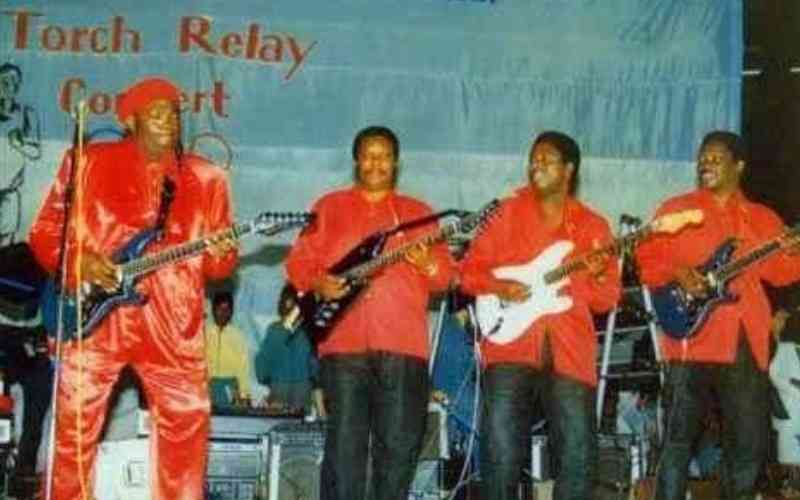
34 years after his death, Franco Luambo Makiadi's name still looms large over the world of Rhumba.
Franco and his baby, the band TPOK Jazz are an indelible part of Rhumba. And while the band outlived him, it did not last long. But how did TPOK Jazz Orchestra come to be?
It was started in the 1950s by, among others, Franco, Vicky Longomba, Jean Serge Essous, De La Lune, Augustin Moniania Roitelet, La Monta LiBerlin, Saturnin Pandi, Nicolas Bosuma Bakili Dessoin, and vocalist Philippe Lando Rossignol.
They used to play at Loningisa Studios in Kinshasa as individual artistes before they got together to form a band in June 1956.
The name OK Jazz originated from the bar where they played, called the OK Bar, owned by Gaston Cassien (who later changed his name to Oscar Kashama, after Authenticite).
The new band played regularly at a studio in the city during the week and on some weekends played at weddings.
In 1957, lead vocalist, Philippe Lando Rossignol quit OK Jazz and was replaced by Edo Nganga, from Congo-Brazzaville. Later in the same year, Isaac Musekiwa, a saxophonist from Zimbabwe, joined the band. Up to that time the band's leadership was shared between Vicky Longomba, Essous and Franco. Essous was replaced by saxophonist Verckys Kiamuangana Mateta.
In 1962 OK Jazz visited Nigeria on their first foreign tour.
Around this time, the band changed their name to TPOK Jazz. TP stood for "Tout Puissant" (all mighty). The quality of their music had improved to where they could challenge African Jazz for the position of Congo's premier group.
Franco's music had a popular appeal mainly because it discussed issues affecting ordinary people on a daily basis. Franco led other Congolese musicians in using new technology to produce sounds of much higher quality than in any other part of Africa. The new technology included electric guitars, amplifiers and basses.
In the late 1960s, Kwamy Munsi and Mulamba Joseph Mujos led nine other musicians in a mass defection from TPOK Jazz. A few months later, saxophonist Verckys Kiamuangana Mateta also left.
Franco recruited Rondot Kassongo wa Kassongo to replace Verckys. He also brought in solo guitarist Mose Fan Fan. Fan Fan had a new style of guitar-playing called sebene, which was more danceable. This style came to be known as Sebene ya ba Yankees. Fan Fan also composed a number of extremely popular hits, including "Dje Melasi".
During the 1970s Franco and TPOK Jazz consolidated their position as one of the two giants of Congolese popular music, along with Grand Kalle & l'African Jazz.
Many musical stars emerged from both of these bands. TPOK Jazz was staging concerts all over Africa, including places such as Chad and Sudan. The band's finances also improved tremendously.
Franco brought on board the composer/vocalist Sam Mangwana. His recruitment energised the band and infuriated Afrisa, where he came from.
In the early 1970s Vicky Longomba, who was then acting as Co-president of the band left. Mose Fan Fan, the band's flamboyant solo guitarist also left. Then Youlou Mabiala quit and formed Orchestre Somo Somo with Fan Fan.
Soon, the band fell upon hard times with low record sales and lowly attended concerts.
Franco was grief-stricken and despondent and stopped playing music for some time. Upon his return, he recorded several songs in memory of his late brother.
He then began to rebuild the band. This coincided with the restructuring of Congo by President Mobutu Sese Seko under the program of "L'Authenticite". The name of the country was changed from Congo-Kinshasa to Zaire.
Franco adopted the name "L'Okanga La Ndju Pene Luambo Luanzo Makiadi".
During this time, vocalist Mayaula Mayoni came on board, along with guitarists Mpundi Decca, Gege Mangaya, Michelino Mavatiku Visi and Thierry Mantuika. Franco then appointed Simaro Lutumba, as the chef d'orchestre. Sam Mangwana composed his hit 'Luka Mobali Moko' around this time.
However, Sam Mangwana left and started a solo career in Cote d'Ivoire.
In 1975 Franco released yet another classic hit Bomba Bomba Mabe.
By the mid-1970s Franco was one of Zaire's wealthiest citizens. He invested heavily in real estate in Belgium, France, and in Zaire. He owned Kinshasa's four largest and most popular nightclubs, the biggest of which was Un-deux-trois.
TPOK Jazz played there every weekend to a packed house.
 The Standard Group Plc is a multi-media organization with investments in media
platforms spanning newspaper print
operations, television, radio broadcasting, digital and online services. The
Standard Group is recognized as a
leading multi-media house in Kenya with a key influence in matters of national and
international interest.
The Standard Group Plc is a multi-media organization with investments in media
platforms spanning newspaper print
operations, television, radio broadcasting, digital and online services. The
Standard Group is recognized as a
leading multi-media house in Kenya with a key influence in matters of national and
international interest.
